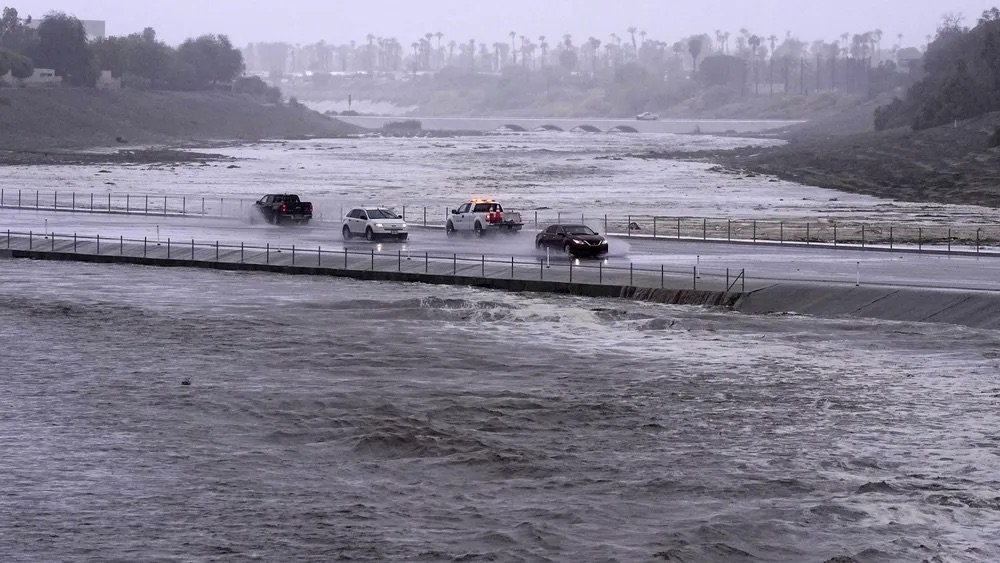The Climate Culprits Hiding Their Role In California’s Extreme Weather



Vehicles cross over a flood control basin in Palm Desert, Calif. On Aug. 20, 2023. (AP Photo/Mark J. Terrill)
As California is pummeled by unprecedented storms and wildfires, corporations are fighting a landmark bill exposing their true contributions to climate change.
One of the nation’s most important climate fights is currently playing out under the radar in California, where state residents are weathering an unprecedented tropical storm. Oil and industry lobbying groups are spending millions in a last-ditch attempt to block first-of-its-kind legislation that would require thousands of large companies doing business in the state to fully disclose their carbon emissions, a move that would effectively set national policy.
In the final weeks of California’s legislative session, which ends in mid-September, Assembly members are expected to vote on the climate transparency bill. With a federal version of the measure still delayed — and nearly certain to face lengthy legal challenges from industry — California’s legislation could expedite a public reckoning over corporations’ true contributions to climate change.
The bill has already passed the state Senate, and if it survives a secretive appropriations hearing later this month, it will go before the full Assembly — where a previous version failed by just four votes last year following a fierce opposition campaign.
California Gov. Gavin Newsom (D), who has been burnishing his climate credentials for a possible presidential run, has yet to weigh in on this year’s climate proposals in his state. A spokesperson told The Lever that the governor plans to evaluate the bill if it reaches his desk.
So far this year, industry opponents have reported spending more than $7 million on state lobbying efforts that included attempting to influence or nix the climate disclosure bill, according to a Lever review of state records. Those opponents include gas and oil companies, which spent more than $1 million, as well as a host of less well-known climate culprits.
Eight cement and asphalt companies, whose carbon-intensive production processes are responsible for more global emissions than airline travel, together spent nearly $150,000 on lobbying during the first half of this year.
Airlines are also lobbying heavily on the bill, as are a laundry list of household brands including almond company Blue Diamond Growers, Coca-Cola, Costco, In-N-Out Burger, Pepsi, Rite Aid, and Walmart. If the measure passes, all of those companies will be required, for the first time, to calculate the carbon emissions that occur across their value chain — not just those involved directly in their day-to-day operations. Such indirect emissions can account for nearly 90 percent of a company’s total carbon footprint.
Most of the same corporations fighting the bill have already set “net-zero commitments” — or “aspirations,” in the parlance of major oil companies — to dramatically cut their carbon emissions in the coming decades. But thanks to fuzzy definitions and accounting sleights of hand, such voluntary corporate commitments are frequently “mere blather,” according to Michael Gerrard, the founder of Columbia University’s Sabin Center for Climate Change Law.
Take Chevron, which has spent $150,000 this year on lobbying, including against the disclosure bill and related legislation. The oil and gas giant’s “2050 net-zero aspiration” depends on “canceling out” emissions through the purchase of so-called carbon offsets that supposedly subsidize climate-friendly projects elsewhere. But a recent report concluded that more than 90 percent of those offsets should be “presumed ‘junk’ until proven otherwise.”
“We are awash in greenwashing,” Gerrard said. “We need standards to set forth what a legitimate net-zero commitment is.”

